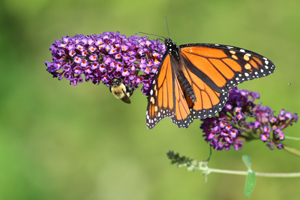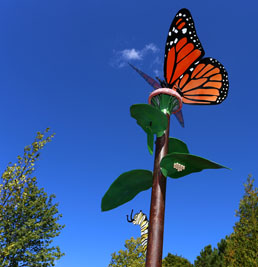Join Monarch Nation
Monarch Nation is a national program for residents of all ages to get involved in actions to help Monarch butterflies and other species at risk in Canada. By joining the network of communities across Canada, you’ll be part of a movement to protect, raise awareness and have fun, while taking action to help these important species.
Tracking Migrations and Seasons
Journey North provides online support and tools to report and track sightings of pollinators and other species. The sightings are mapped in real-time as waves of migrations move across the planet. You can use Journey North to report sightings of pollinators, view maps, take pictures and leave comments.
Insight Citizen Science
Insight Citizen Science is a mobile app designed to help citizens learn about North America’s essential pollinators and participate in observation-based research. The app includes an Insight Guide to learn about the observation process and how to identify pollinators. You can then record your findings and explore past observation data submitted by the citizen science community.
Pollinator-Friendly Plant List
Credit Valley Conservation has compiled a list of beautiful pollinator-friendly native plants. Take a look and give some a try to attract and help butterflies, bees, moths and other important pollinators
Creating a Habitat
Toronto Region Conservation created an educational guide about the proper ways to create habitat in your own backyard. Providing habitat can give wildlife a greater chance of survival and the opportunity to maintain and increase their population.
The Pollinator Partnership Canada
The Pollinator Action Team/Pollinator Partnership Canada (P2C) provides Ontario ecoregional planting guides to help you select the best plants for pollinators in your region. They also welcome and encourage highly motivated individuals to apply to become volunteers and or to gain experience through internships.
Wildlife Preservation Canada
Wildlife Preservation Canada's mission is to save animal species at risk from extinction in Canada by providing direct, hands-on care. Several pollinating butterfly and bee species have recently been categorized as 'at risk' in Canada. Wildlife Preservation Canada's pollinator initiative aims to save these important insects from extinction.
Bumble Bee Watch
Bumble Bee Watch is a collaborative effort to track and conserve North America's bumble bees!
Feed the Bee's
Basic information regarding pollinators in Ontario and how to help them.



